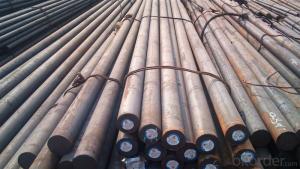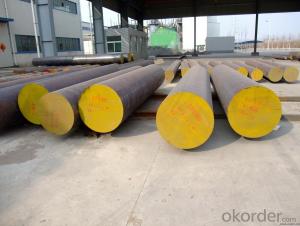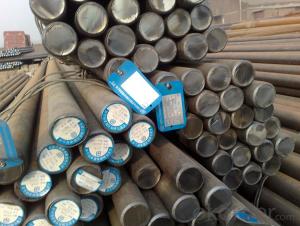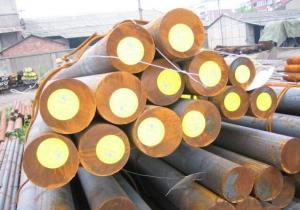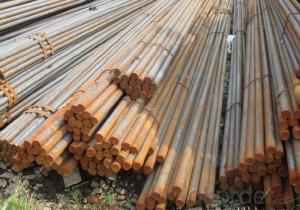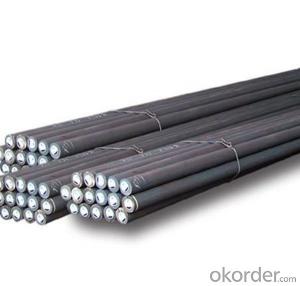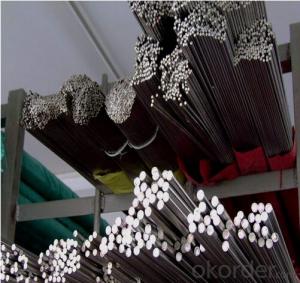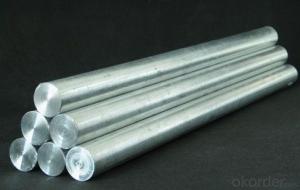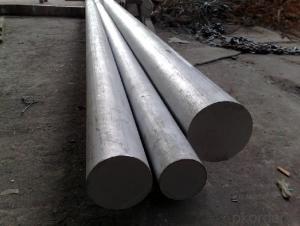9CrWMn Mould Steel Special Steel Carbon Steel
- Loading Port:
- China main port
- Payment Terms:
- TT OR LC
- Min Order Qty:
- 25 m.t.
- Supply Capability:
- 10000 m.t./month
OKorder Service Pledge
OKorder Financial Service
You Might Also Like
Specification
Chemical Composition(%)
Country | Standard | C | Si | Mn | Cr | W | S | P | Other |
China(GB) | 9CrWMn | 0.85-0.95 | ≤0.40 | 0.90-1.20 | 0.50-0.80 | 0.50-0.80 | ≤0.30 | ≤0.30 | |
USA(ASTM) | O1 | 0.85-0.95 | 0.20-0.40 | 1.00-1.30 | 0.40-0.60 | 0.40-0.60 | - | - | V:0.20 |
Germany(DIN) | 1.2510 | 0.90-1.05 | 0.15-0.35 | 1.00-1.20 | 0.50-0.70 | 0.50-0.70 | ≤0.35 | ≤0.35 | V:0.05-0.15 |
Japan(JIS) | SKS3 | 0.90-1.00 | ≤0.35 | 0.90-1.20 | 0.50-1.00 | 0.50-1.00 | ≤0.30 | ≤0.30 |
Available Size
Rolled flat steel :12-90mm × 205-610mm × L
Heat Treatment
Processing | Temperature ℃ | Hardness |
Anneal | 740-770 | ≤255HB |
Quenching | 790-840 | 62-65HRC |
Tempering | 180-250 | 58-62HRC |
Characterstics
1.High-carbon and low-alloyed oil quenching tool steel adopted widely in world
2.Higher hardening ability
3.Less deformation after heat treatment
4.High hardness and better abrasion resistance
Applications: Suitable for steel punching dies,shearing blades,measuring devices,thermosetting plastic moulds,etc


1, Your advantages?
professional products inquiry, products knowledge train (for agents), smooth goods delivery, excellent customer solution proposale
2, Test & Certificate?
SGS test is available, customer inspection before shipping is welcome, third party inspection is no problem
3, Payment Terms?
30% TT as deposit and 70% before delivery.
Irrevocable L/C at sight.
4, Trading Terms?
EXW, FOB, CIF, FFR, CNF
6, After-sale Service?
We provides the services and support you need for every step of our cooperation. We're the business partner you can trust.
For any problem, please kindly contact us at any your convenient time.
We'll reply you in our first priority within 24 hours.
- Q: What are the factors to consider when selecting special steel for a specific application?
- When choosing special steel for a particular use, there are several critical factors to take into account: 1. Mechanical properties play a crucial role in determining the steel's suitability for the application. Strength, hardness, toughness, and ductility are all important considerations. Matching the steel's mechanical properties to the specific requirements of the application is essential to achieve optimal performance and ensure safety. 2. The steel's resistance to corrosion is another key factor to consider. Different environments, such as marine, chemical, or high-temperature conditions, may necessitate the use of corrosion-resistant alloys or coatings. This is vital to ensure the steel's longevity and reliability in service. 3. Temperature resistance is crucial in many applications. The steel must be able to withstand high or low temperatures without compromising its mechanical properties. Factors like thermal expansion, thermal conductivity, and resistance to thermal fatigue should be taken into account to ensure effective performance in the intended environment. 4. If welding or fabricating the steel into complex shapes is necessary, the ease of weldability and fabricability becomes an important consideration. Certain steels may require specialized welding techniques or preheating to prevent cracking or distortion during fabrication. 5. Cost is a significant consideration as well. It is important to find a balance between the desired properties of the steel and the available budget. This ensures cost-effectiveness without compromising performance or safety. 6. The availability of the chosen steel grade in the required form, size, and quantity is another critical factor. It is crucial to ensure that the selected steel can be easily sourced and obtained within the required timeframe. This helps to avoid project delays or cost overruns. 7. Compliance with industry-specific standards, specifications, or regulations is essential. Depending on the industry or application, there may be specific requirements that the steel must meet. Selecting a steel grade that complies with these standards is necessary to ensure compliance and maintain necessary certifications or approvals. By considering these factors, engineers and manufacturers can make well-informed decisions when choosing special steel for specific applications. This ensures optimal performance, durability, and safety.
- Q: What are the main advantages of using special steel in the mining industry?
- The main advantages of using special steel in the mining industry are its exceptional strength, durability, and resistance to wear and corrosion. This allows for the construction of heavy-duty equipment and machinery that can withstand the harsh and demanding conditions of mining operations. Special steel also has the ability to retain its properties at high temperatures, making it suitable for applications such as drilling and cutting through tough materials. Additionally, it offers increased safety by minimizing the risk of equipment failure, ensuring a more efficient and productive mining process.
- Q: How is boron steel used in automotive safety applications?
- Boron steel is used in automotive safety applications due to its high strength and ability to absorb and distribute impact energy. It is commonly used in the construction of safety cages, reinforcements, and components such as side impact beams, door beams, and crash boxes. Its exceptional crashworthiness properties help improve the structural integrity of vehicles, enhance occupant protection, and reduce the risk of serious injuries during accidents.
- Q: What are the main characteristics of heat-resistant steel?
- The main characteristics of heat-resistant steel include high resistance to oxidation, excellent strength at elevated temperatures, good thermal stability, and the ability to maintain its structural integrity even under extreme heat conditions.
- Q: What are the different welding techniques for special steel?
- There are several different welding techniques that can be used for special steel, depending on the specific requirements and characteristics of the steel. Some of the commonly used welding techniques for special steel include: 1. Shielded Metal Arc Welding (SMAW): Also known as stick welding, SMAW uses a consumable electrode coated in flux to create an arc between the electrode and the base metal. This technique is versatile and can be used for a wide range of steel types, including special steel. 2. Gas Metal Arc Welding (GMAW): Also known as MIG (Metal Inert Gas) welding, GMAW uses a continuous solid wire electrode and a shielding gas to protect the weld from atmospheric contamination. This technique is commonly used for thinner special steel materials. 3. Flux-Cored Arc Welding (FCAW): Similar to GMAW, FCAW uses a continuous tubular electrode filled with flux. This flux provides additional shielding and can allow for higher deposition rates. FCAW is suitable for special steel with thick sections or when welding in outdoor or windy conditions. 4. Gas Tungsten Arc Welding (GTAW): Also known as TIG (Tungsten Inert Gas) welding, GTAW uses a non-consumable tungsten electrode and a shielding gas. This technique is known for its precision and is often used for special steel alloys that require high-quality and aesthetically pleasing welds. 5. Plasma Arc Welding (PAW): PAW is similar to GTAW but uses a more focused arc created by passing gas through a constricted nozzle. This technique is often used for special steel alloys that have higher melting temperatures or require deeper penetration. 6. Submerged Arc Welding (SAW): SAW involves feeding a continuous wire electrode into a molten flux layer that covers the weld. This technique is commonly used for heavy and thick special steel sections, as it provides excellent penetration and high deposition rates. It is important to choose the most appropriate welding technique for special steel based on factors such as the steel composition, thickness, intended application, and desired weld quality. Consulting with a qualified welding professional or referring to the steel manufacturer's recommendations can help ensure the best welding technique is selected for the specific special steel being used.
- Q: What are the different surface treatments used for special steel?
- There are several surface treatments commonly used for special steel, including galvanization, nitriding, carburizing, and plating. Galvanization involves applying a protective zinc coating to prevent corrosion. Nitriding is a heat treatment process that enriches the surface of the steel with nitrogen, enhancing hardness and wear resistance. Carburizing involves introducing carbon into the steel's surface, creating a hardened layer. Plating, on the other hand, involves covering the steel with a thin layer of another metal, such as chrome or nickel, for improved aesthetics and corrosion resistance.
- Q: How is special steel used in toolmaking?
- Special steel is used in toolmaking because of its exceptional properties such as high hardness, toughness, and wear resistance. It is utilized to manufacture various types of tools including drills, cutting tools, dies, and molds. The superior properties of special steel enable these tools to withstand high temperatures, resist deformation, and maintain sharpness for extended periods. Additionally, special steel can be heat treated to achieve specific characteristics, making it an ideal choice for toolmaking applications.
- Q: What are the properties of aluminum alloys?
- Aluminum alloys possess several properties that make them highly desirable in various industries. These properties include lightweight, excellent corrosion resistance, high strength-to-weight ratio, good formability, and electrical conductivity. Additionally, aluminum alloys can be easily cast, machined, and welded, making them highly versatile in different applications.
- Q: How does special steel perform in terms of wear resistance in abrasive environments?
- Special steel is known for its exceptional wear resistance in abrasive environments. The unique composition and heat treatment processes used in the production of special steel result in a higher hardness level compared to standard steels. This increased hardness makes special steel highly resistant to wear caused by abrasive particles or surfaces. In abrasive environments where friction and contact with hard materials are prevalent, special steel exhibits excellent performance. It can withstand the erosive effects of abrasive particles, such as sand, rocks, or metal fragments, without significant wear or damage. This durability makes special steel an ideal choice for various applications, including mining equipment, cutting tools, industrial machinery, and automotive components. Moreover, the wear resistance of special steel is not only limited to its surface but also extends throughout its structure. This means that even if the surface of the steel is scratched or abraded, the underlying material remains highly resistant to wear. This characteristic ensures a prolonged lifespan of components made from special steel, reducing maintenance costs and downtime. Furthermore, special steel can maintain its wear resistance even under high temperatures. This property is particularly advantageous in abrasive environments where friction-induced heat can accelerate wear. The ability of special steel to retain its hardness and wear resistance at elevated temperatures ensures its effectiveness in demanding applications like high-speed machining or hot forging. Overall, special steel outperforms standard steels in terms of wear resistance in abrasive environments. Its superior hardness, structural integrity, and temperature resistance make it an excellent choice for applications where durability and longevity are essential.
- Q: How is special steel used in the manufacturing of industrial machinery?
- Special steel is used in the manufacturing of industrial machinery due to its exceptional properties such as high strength, hardness, and resistance to wear and corrosion. It is commonly used to create components like gears, shafts, and bearings, which are critical for the smooth and efficient functioning of machinery. Additionally, special steel can withstand extreme temperatures and pressures, making it suitable for applications in heavy-duty machinery and equipment, ensuring reliability and durability in industrial settings.
Send your message to us
9CrWMn Mould Steel Special Steel Carbon Steel
- Loading Port:
- China main port
- Payment Terms:
- TT OR LC
- Min Order Qty:
- 25 m.t.
- Supply Capability:
- 10000 m.t./month
OKorder Service Pledge
OKorder Financial Service
Similar products
Hot products
Hot Searches
Related keywords
